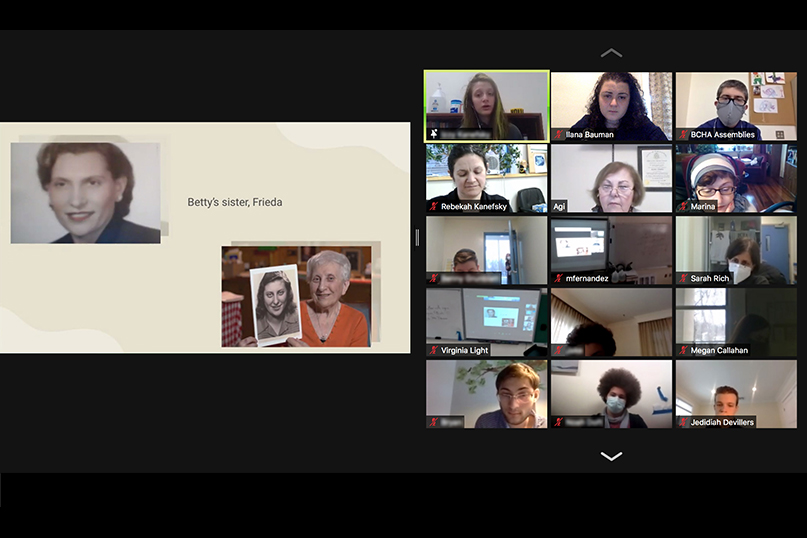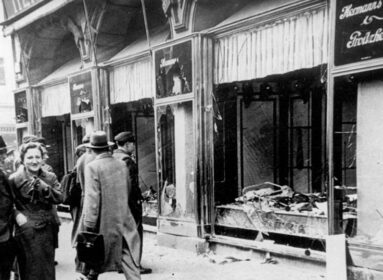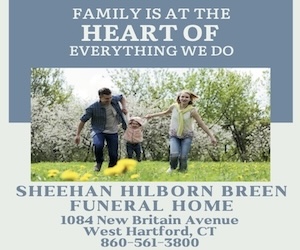
S
iegmund Listwa had a lot to teach Julianne Katz and, admits Julianne, “I had a lot to learn.”
And learn she did recently, when the Bi-Cultural Hebrew Academy Upper School junior participated in the school’s new Holocaust Fellowship program. Presented in conjunction with the Anachnu Holocaust Survivor program of the Schoke Jewish Family Service of Fairfield County, the Holocaust Fellowship program partners students at the Stamford school with survivors to record the survivors’ stories, followed by a school presentation.
“In March 2020, Schoke JFS and BCHA launched a program through which students were trained in Person-Centered, Trauma-Informed (PCTI) practices prior to interviewing survivors with whom they were partnered, with the goal of creating a live history theater,” explains Rebekah Kanefsky, Schoke JFS Director of Case Management and Family Life Education Coordinator. “Our agency decided to revive the program this year and contacted the school, who then developed the idea to create the Holocaust Fellowship program with the goal of partnering student and survivor to record their story, followed by a live school presentation.”
Kanefsky, along with Schoke JFS Bilingual Program Director Miriam Sapir, then trained the BCHA students in PCTI and matched them with survivors.
Julianne Katz was one of five BCHA Upper School students who, over the course of six weeks, each interviewed a Holocaust survivor about their experiences, under the guidance of Dr. Taly Ashkenazi, a member of the BCHA faculty.
The program culminated in a Zoom event held on Jan. 27 – International Holocaust Remembrance Day – at which the students recounted for classmates the story of the survivor they interviewed.
In addition to Julianne, the BCHA Holocaust Fellows included Noah Doft, Menucha Goldberg, Benny Grunblatt and Izzy Kanefsky.
Also joining the Zoom event was Holocaust survivor Agnes Vertes, president of Child Holocaust Survivors of CT, who stressed the importance of passing on survivor memories medor l’dor – from generation to generation. Vertes told the students that with the passing of the generation of Holocaust survivors it will soon become the responsibility of the younger generation of Jews to insure that the story of the Holocaust is not lost in time.
According to Julianne, Holocaust survivor Siegmund “Ziggy” Listwa would agree.
“Ziggy, without fail, always told me how much it meant to him that I wanted to grow and learn more about the war and his story,” Julianne wrote in the essay she presented at the Zoom program. “He told me how much he loved that I wanted to share his story. We may not be able to rewrite history or fix the past, but we have the ability to change the future, and make the most of our present.”
The experience of interviewing the survivors not only equipped students to pass on the reality of this tragic moment in Jewish history, notes Dr. Ashkenazi, it also served to strengthen their ties to their heritage.
“I personally feel that the Holocaust is an important part of Jewish identity,” she says. “Had it not been for COVID-19, I would have preferred that the students meet the survivors in person, and establish a continuous and lasting connection. However, they were still able to connect virtually, and some, I believe, will continue to keep in touch.”
For the BCHA Holocaust Fellows, since interviewing the survivors the word “Holocaust” has taken on a deeper, more profound meaning.
“You hear the word “Holocaust, but you don’t really think much about it. You might think, ‘yes that was a terrible time’, but you don’t really think about the meaning of the word, and all the history it carries,” explains Julianne. “From now, going forward, whenever you come across the word “Holocaust” I want you to really take a minute to think of the families broken, the lives shattered and torn.… I want you to ponder on the ways to carry the legacy of survivors who triumphed over the agony of the Holocaust, and how you can keep future generations from ever forgetting the past.”
Main Photo: Holocaust survivor Elizabeth “Betty” Deutsch, who was interviewed by BCHA Upper School freshmen Izzy Kanefsky, shares her story at the students’ Zoom event on Jan. 27.








 Southern New England Jewish Ledger
Southern New England Jewish Ledger









